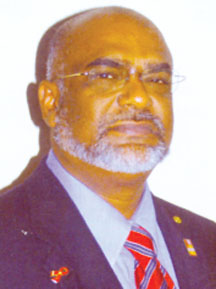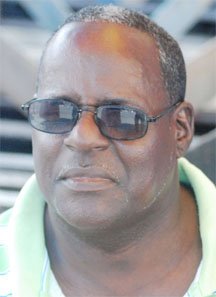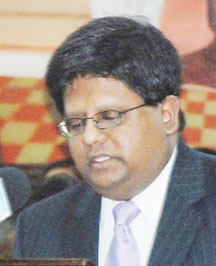– small businesses urge more tax relief for wage earners
Even as private sector officials laud the announcement in last Monday’s budget presentation that government will now effect a long sought after reduction in corporate taxes, small business owners and wage earners in the city have assumed a largely indifferent posture, providing mostly a what’s-in-it-for-us res-ponse to invitations from this newspaper to comment on Finance Minister Ashni Singh’s $161.4 billion budget.
On Tuesday, Private Sector Commission (PSC) Chairman Ramesh Dookhoo summoned a media briefing to deal largely with the announcement by the finance minister that corporate taxes will now be reduced by 5 per cent and to praise government for the decision. Other businessmen too, including Komal Ramnauth and Clinton Urling, president and secretary respectively, of the Georgetown Chamber of Commerce and Industry labelled the budget a “good” one without embracing altogether the unmitigated praise showered on the budget by the PSC.
 Urling, proprietor of the popular creole restaurant German’s, who told Stabroek Business that his comments were being made in his capacity as a businessman, said he had seen measures of both “boldness” and “dyna-mism” in the 2011 budget. However, he said the PSC may have “acted with haste” in seeking to provide a public response to the budget on Tuesday. “That being said, it’s probably the boldest budget we have seen in years,” Urling added.
Urling, proprietor of the popular creole restaurant German’s, who told Stabroek Business that his comments were being made in his capacity as a businessman, said he had seen measures of both “boldness” and “dyna-mism” in the 2011 budget. However, he said the PSC may have “acted with haste” in seeking to provide a public response to the budget on Tuesday. “That being said, it’s probably the boldest budget we have seen in years,” Urling added.
And while Urling was also upbeat over the announced 5% lowering of corporate taxes he stopped short of endorsing the “leap of faith” comment made in the PSC press release. “It’s a start,” Urling told Stabroek Business. “What it does is to create more room for businessmen to re-invest in the economy. Personally, I feel the corporate tax should be somewhere between 20 and 25 per cent.”

With regard to the new income tax threshold, Urling said while that too had to be acknowledged as “a positive coming out of the budget” it still does not go far enough in easing the tax burden on wage earners. “Ideally, we ought to be looking at a threshold of around 75 per cent,” he told Stabroek Business. He said the “revenue windfall” secured from the collection of value added taxes was certainly more than enough to take care of an income tax threshold of 75 per cent. “Ideally, we really ought to be working towards abolishing income tax altogether since the revenue earnings from VAT are sufficient to cover the removal of income tax and that would be the case even if VAT were to be reduced to 10 per cent. We need to give the people the money.”
Ramnauth, who is also managing director of the office stationery and supplies establishment, Kojac Marketing, told Stabroek Business that while the Chamber needed to study the contents of the budget more closely before commenting he too felt that the budget was “a good one” that reflected an inclination towards spending. “It really does not matter whether or not you see it as an election budget. The fact of the matter is that there is money there to get things done. Ramnauth said he believed that there was still more work to be done “on taxes” but the private sector was prepared to keep working with government within the framework of the National Competitiveness Strategy.

Comments on the 2011 budget from proprietors of downtown business houses and smaller vendors in and around the municipal markets were few, with most of them telling this newspaper that they had not yet found the time to study the budget and its implications. The few businessmen who agreed to comment briefly on condition of anonymity told Stabroek Business that the cut in corporate taxes was welcome and long overdue. The principal concern, however, appeared to be that the decision to raise the income tax threshold was not enough to release more disposable income to wage earners. “If there is little to spend then the business community still has a problem,” one Regent street businessman told this newspaper.
The outlook of small and micro businesses, including municipal market stallholders and vendors was perhaps best reflected in the comments of Jeff, a vendor who offers bread, cakes and eggs for sale outside Bourda market. Brushing aside a question from this newspaper about reduced corporate taxes Jeff said he was “disappointed” in the lack of provision for workers in the budget. “We keep hearing a lot about the low wages being paid to private security guards and people who work in restaurants and stores. Personally, I would have liked to see the budget saying something about a decent minimum wage for these people,” he added.
Like other small traders with whom Stabroek Business spoke Jeff said the budget needed to be more explicit on “what’s in it (the budget) for the poor man.” When this newspaper pointed out that the lowering of the tax threshold meant that wage earners would now have more disposable income he declared that rises in consumer goods prices were likely “to take care of” the new tax threshold “within a matter of months”.
Asked to comment on the five per cent reduction in corporate taxes announced in the 2011 budget Jeff said the benefits of such a measure would redound to big business. “They are gaining; they are getting richer,” he added.

When Stabroek Business visited the Bourda Market on Wednesday Peter Ramsaroop who is now campaigning for the presidency weighed in with his own response to the 2011 budget. Ramsaroop said one of his primary concerns with the budget was that it had failed to address investments in new industries and in infrastructural works designed to aid the development of the country. He said he had “particularly noted” the fact that the 2011 budget is silent on issues like the completion of the Guyana/Brazil road link and the building of a deep water harbour. And while he said he believed VAT provided an effective means of broadening the tax net, he added that government should effect successive reductions in VAT rates, to 10 per cent this year and eight per cent in 2012.




